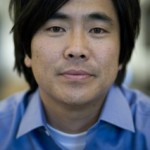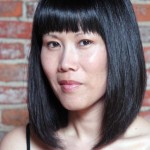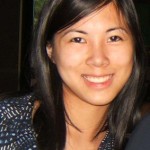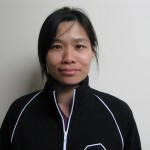John Yau
John Yau has published many books of poetry, fiction, and criticism, as well as contributed essays to art monographs. A book of poetry, Further Adventures in Monochrome, is forthcoming in 2012 from Copper Canyon Press. The recipient of fellowships from National Endowment for the Arts fellowship, Ingram-Merrill Foundation, New York Foundation of the Arts and the John Simon Guggenheim Foundation, he teaches in the Visual Arts program at Mason Gross School of the Arts (Rutgers University). He and his family live in New York.
Biopic
In the film, before the hero’s train is intercepted and parboiled by hoary hooligans, a woman in a white chiffon dress is seen ascending the marble stairs of a casino in the resort town of Deauville, which, as many cinephiles know, is the name of the little station where a French writer, who was possessed by dubious habits, was scheduled to disembark at the beginning of each summer, ready to author a succession of hand-painted postcards for the amusement of his friends stuck in menial jobs back in Paris.
The bandits’ costumes ran the gamut, from mid 19th century aristocrats with swords to a Hollywood Chinaman’s get-up, complete with rifles and binoculars taken from dead cavalrymen, complete with yellow bandanas. (The color provides a crucial clue to the sequel).
The leader wore a stovepipe hat festooned with black lace. He had a wooden leg, which he placed on the chair beside his bed when he slept at night.
Once the cast of characters is introduced, the water rises further, and the train crew battens down the hatches, and the flooding of outside influences takes hold. Clearly, they had started the wildest leg of their journey, and, from now until they reach what some scholars conveniently designate as the terminal departure point, the situation becomes increasingly fraught with potential disasters.
The suspension bridge with its missing slats and frayed rope would have proved a welcome distraction, but it was, sadly enough, inserted rather early in the first reel. All was in turmoil. Entire villages and towns cursed the night and whatever else befell them, including rust and unharvested grain. Blame was assigned, and firing squads were dispatched to all parts of the fading empire.
The bank’s doors are stamped CLOSED. Money becomes a source of shame, which the young woman finds amusing as she lights a cigar with a greenback.
Outside the window, volcanoes stir their vats of inoculated pyres.
Fires race down the mountains, eager to embrace their guests.
He was part of the first wave of immigrants to climb the rope ladder they – and “they” will always be called that – dangled down the moss-covered wall of success. They said it was slippery, but that is only the tip of the iceberg, what gets put down on paper, the tales taught to children so they will accept disappointment and believe they deserve their fate.
I sometimes refer to him as my “father,” but that only serves to indicate a biological relationship. There are many kinds of bonds, and these have been dated and preserved in the appropriate places, such as the magazine rack in corner drugstores. It’s not that this story is different. It’s not even that this story is the same. About the rest, I will not say more.
She was raised to be in the background, but its flowers did not suit her. If you need be told, she is (was) my mother. Dead now and part of the wallpaper with a floral motif interrupted by disasters, sickness, and war.
After winding its way through the lower Alps, the train descended the slopes and began chugging through the rainforest until, after many days, the fog parted and the coast became visible. That, the engineer thought, is where the beaches are, and where I first saw my bride-to-be standing alone under the sun. Unbeknownst to the passengers sitting in their compartments, Eugene Boudin was at the beach that fateful afternoon, and his painting has become known among a select few as The Engineer’s Dream. This group is not universally recognized because, as a minor character in the author’s masterpiece points out, it was too big and unselective to be memorable.
Things turn out very differently, which is a necessary condition of starting out, though this sticking point is never mentioned in any contract.
Amidst the beginning of an era, end of an epoch, turning of the steering wheel.
We declare these groups and groupings to be self-evident, which preoccupies later generations of scholars and judges, some of whom carry shotguns under their robes. If there is any doubt, your reaction is all that is needed.
Seeing eye to eye is fruitless since mine are crossed and one of yours is missing.
Shot In The Documentary Mode
I sit on a scarred wooden bench in an olive-colored bus with rows of other shoeless boys. A bird with black feathers studies the bus’s inhabitants. The tarred blue road on which our vehicle has been placed, vanishes at the blue horizon line, leaving the passengers perplexed as to what happens next.
Tonight the moon is made of pearlescent paint and gum arabic.
Tonight the moon is a crow with one red eye
dangling upside down from the ceiling.
A machine-made voice announces that we are a herd of cows on our way
to becoming cowards.
The clouds temporarily obscuring the moon reflected in a boy’s eyes are interrupted by an omniscient narrator, who tells the audience that the evening’s itinerary includes being transported to the outskirts of the mortal sky, its carousel of gilded horses surrendering to the pink and green clouds.
This is the legacy of being born in another century.
Before electricity is collected in jars.
Before colors had names like Scarlet Lips and Whiplash Watermelon.
Before a man immerses his skinny legs in baggy shorts
and picks out his favorite polka dotted shirt.
Before melancholy, mellow, and memorable are removed
from the approved adolescent vocabulary.
The bus rolls through small towns pockmarked with faded signs staring down from dusty brick walls. Red dust settles onto the window ledges.
Angry that a busload of children are passing through their town, smooth-faced adults stream out of diners and drugstores, howling and wildly throwing debris at the gleaming, riveted dirigible.
Meanwhile, we are taught that hag collectors have become increasingly difficult to identify. First, in a world where everyone wears gloves to ward off germs, you have to find someone with gnarled hands and a predilection for warts, but after that everything gets hazy, and those who have ventured into these ghastly woods have seldom returned.
Someone in the back says we are having a dream, that the lessons we are learning are discarded by-products of bad poetry, which children have been forced to memorize for years.
Someone else says that by sitting on our hands, and acting dumb, we can learn to sleep in a deeper cave, where dreams are unable to penetrate.
But for others – the ones who read poetry in the dark—these answers only make matters worse.
Oasis
Noisy cloud cover dissuades us from bubbling over.
After we pull into the truck stop, get off our camels, and enter the pinball arcade, the air slims down to a silvery glimmer.
The three men in blue uniforms should have warned us of the consequences, but, according to the instruction manual, their sole function is to greet and direct strangers down the path, leading to the warehouse of hidden treasures on sale. On polished stones fitted together, like gears, we pass blue pediments embalmed in hair, a row of empty barracks.
Tom, Dick, and Harry––their shirt pockets were embroidered with a message of subtly increasing size. At first, we didn’t think anything of this warning sign for the hazards of infinity, but the worms they spawned grew under our skin.
Our group leader, Hermes Trismegestus, pointed out that each path leading into the arcade was lined with identical rows of lampposts, and that all the paths radiated from a central marble arch, while retreating neatly toward the gold leaf horizon. It was as if a man with an inverted glass eye had invented this perspective.
What happened next to the crystal orb remains a mystery, which is why it is the subject of numerous late night television documentaries devoted to separating half-truths from complete fiction. Some of us are intrepid travelers in the labyrinth of half-truths, while others prefer to be enthralled by complete fiction, its various branches and outposts, including the ones overrun by bougainvillea. But such differences should be expected among those who guide wooden tubs to their demise for a small but earnest wage.
Sinbad’s interpretation revolved around an alchemist who first became famous in Baghdad for the invention of a garden that fit easily in a young girl’s tattooed palm, but which contained examples of flowers so rare that there is no record of them having been seen elsewhere. At dusk, herds of yellow deer emerged and munched on leaves, assiduously ignoring everything that was shiny but wasn’t colored green.
A warm, well-modulated voice calmly interrupted him.
I am not actually doing any of the speaking, but it is my voice (in its new guise) that I hear clattering outside my head, rather than just rolling around inside it, like a ball bearing in the maw of a broken machine. I have become the unwarranted object of a ventriloquist’s attention. This is how I fell out of the sky and landed in the parking lot of a truck stop that ended with the letter, “a” (Arizona, Montana, and Samoa). Since then, many months, moons, mopeds, and morons have scooted by.
Butterflies continue feeding on the corpses of old statues.
Foxes sit around and recount tricks they played on humans.
Regrettably, I have settled into a routine that includes waiting for my friends to catch up with me or, in some instances, leave me behind, alone in a forest presided over by an owl with one eye, its semi-solid mass of particles moving surreptitiously through time and space’s bumpy terrain.


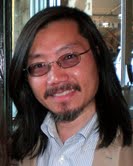
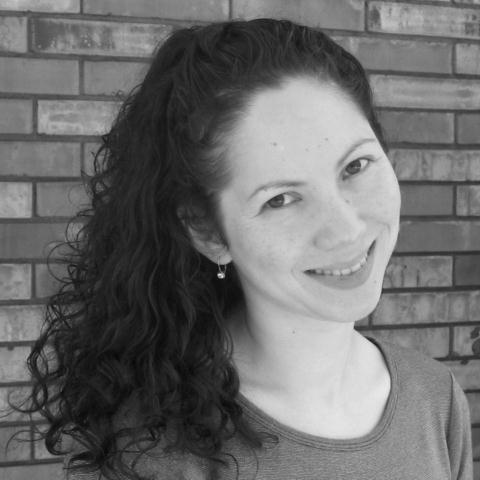 Kim-An Lieberman is a writer of Vietnamese and Jewish American descent, born in Rhode Island and raised in the Pacific Northwest. She holds a Ph.D. in English from the University of California, Berkeley. Her poetry collection, Breaking the Map, won the 2008 First Book Award from Blue Begonia Press.
Kim-An Lieberman is a writer of Vietnamese and Jewish American descent, born in Rhode Island and raised in the Pacific Northwest. She holds a Ph.D. in English from the University of California, Berkeley. Her poetry collection, Breaking the Map, won the 2008 First Book Award from Blue Begonia Press.
